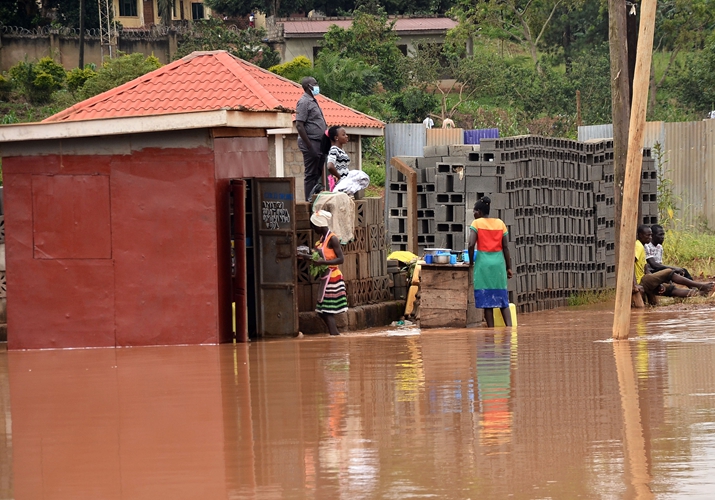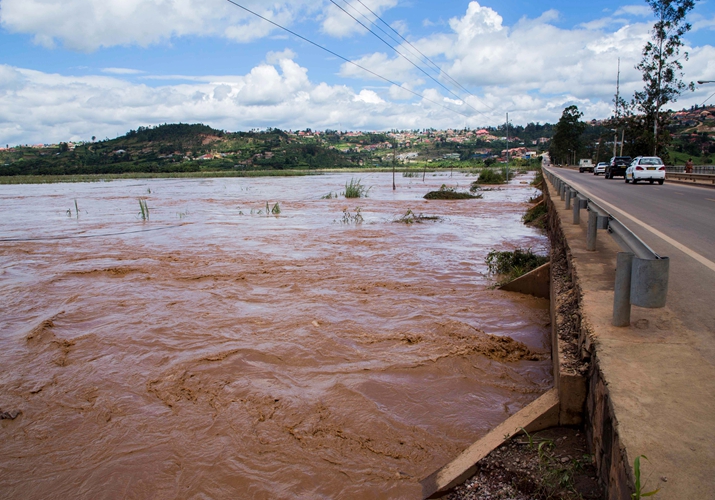|
||||||||||
| Home Nation World Business Opinion Lifestyle ChinAfrica Multimedia Columnists Documents Special Reports |
|
||||||||||
| Home Nation World Business Opinion Lifestyle ChinAfrica Multimedia Columnists Documents Special Reports |
| ChinAfrica |
| Governments and relief organizations rally to assist with flooding in East Africa |
| Since March, constant heavy rains have wreaked havoc in parts of East African countries like Rwanda, Burundi, Djibouti, Ethiopia, Uganda and Kenya, culminating in flooding with devastating effects |
| By Godfrey Fluky VOL.12 December, 2020 ·2020-12-14 |

Floods at Gabey Village near Lake Victoria in the suburbs of Kampala, Uganda (RONNIE IAMBUS)
Since March, constant heavy rains have wreaked havoc in parts of East African countries like Rwanda, Burundi, Djibouti, Ethiopia, Uganda and Kenya, culminating in flooding with devastating effects.
There are fears that the rain and floods will continue to the end of 2020, with meteorologists saying the floods might even go on into January next year.
They say the cause of heavy rains that led to floods is the positive Indian Ocean Dipole, a climate system defined by the difference in sea surface temperature between western and eastern areas of the ocean, which led to above average rainfall over East Africa during the October-December 2019 rainy season. This was followed by above average rainfall between January and March 2020, which continued till May. In all of the region's countries, above average rainfall continued throughout the year.
Figures released in a recent statement by the UN Office for the Coordination of Humanitarian Affairs (OCHA) indicate that this year, the number of people hit by seasonal flooding in East Africa has increased more than five-fold in four years. Almost 6 million people have been affected in 2020, with 1.5 million of them forced from their homes.
The OCHA said 1.6 million people were affected in Somalia, 1.1 million in Ethiopia, 800,000 in Kenya, more than 700,000 each in Sudan and South Sudan, more than 300,000 in Uganda and more than 10,000 Tanzania.
The UN has advised countries hit by floods to take the necessary measures to sensitize people about the COVID-19 pandemic.
Lake Victoria flooded
While addressing the nation on November 9, Ugandan President Yoweri Museveni lamented the flooding of Lake Victoria, the second-largest fresh water lake in the world, for over a year, killing dozens of people and displacing thousands. He also mentioned flooding of the Nile and other water bodies in the country.
"The water level in Lake Victoria has been unprecedented since 1964, when the water level was 13.441 meters, while it is currently 13.49 meters, the highest-ever recorded," said Museveni.
He instructed the Ministry of Health to provide masks to all those who have been displaced by the floods so that they can guard themselves against COVID-19.
However, floods obviously increase the incidence of water-borne diseases, impact hygiene and sanitation, and reduce the capacity to put in place effective preventative measures against COVID-19.
Lake Victoria, which is the source of the Nile, the world's longest river, is located between three East African countries, namely Tanzania, Kenya and Uganda. All three have felt the brunt of the flooding of the lake.
Incidentally, the Nile, which passes through South Sudan, Sudan, and Ethiopia, has also flooded, bringing devastation to people who live near the banks of the river in those countries, and causing significant crop damage in riverine areas. The African Development Bank Group has approved an emergency assistance relief package of $440,000 to fund ongoing humanitarian and emergency relief efforts in areas recently hit by floods in South Sudan and Sudan.

Heavy rainfall causes floods in Rwanda in May(XINHUA)
Vast devastation
Meanwhile, Uganda police spokesman Fed Engaging said that more than 120 people have been killed by floods in the country since March this year. "Many families have been displaced and their crops destroyed following floods triggered by heavy rain," he said.
Residents on some islands on Lake Victoria were told to evacuate for fear of their villages being submerged.
Burundi and Rwanda have also not been spared, with thousands displaced and dozens of deaths. Authorities in Rwanda said they relocated all those who were displaced by floods to higher grounds and also ensured that they all adhere to the COVID-19 prevention guidelines.
In Kenya, more than 800,000 people have been affected by the continuous heavy rains. The Red Cross Society in Kenya said more than 320 people have died from floods this year.
Kenyan Government spokesperson Cyrus Gunar said in a statement that floods affected 29 of the country's 47 counties. "Floods have displaced thousands of people, complicating efforts to protect the spread of COVID-19."
Apart from helping relocate those affected and treat the wounded, the Red Cross Society in Kenya said that it also provided emergency basic requirements.
Since April, most of Somalia's rivers have burst their banks. Floods are still ongoing, and, according to the Islamic Relief Worldwide, a charity organization with one of its bases in Somalia, more than 1 million people have been affected by floods there, with more than 100 killed and 35 injured.
The organization said they provided tents, food and medicine to some of those affected by the floods, and warned about the dangers of COVID-19 and keeping protocols in place whenever possible.
According to the OCHA's ReliefWeb, the largest humanitarian information portal in the world, 200 people had died from floods this year in the Democratic Republic of the Congo (DRC). Back in April, 640,000 were left homeless in flooding in the country's South Kivu Province.
Pascal Mwanamboka, a local leader in Aru territory in east DRC, said, "The UN reportedly airlifted some of those affected by floods to safety. It also provided food and other necessities to where they were relocated."
In South Sudan, the UN said some communities living near the Nile have fled to higher grounds after the river flooded. The UN Resident Humanitarian Coordinator in the country Alain Noudehou said at the end of September that vast areas of the country along the Nile were under water, noting that more than 600,000 people have been affected since July. Noudehou said that more than $80 million is needed for the overall flood response in South Sudan up to December.
In cities like Kampala, Uganda, efforts are being made to improve drainage. "We are expanding the outlets of rain water so that we can avoid floods in future," said Kampala City Assistant Engineer Charles Kizito.
David Musenze, a member of the World Climate School, which raises awareness about climate change, said that in order to minimize deaths from floods, people should avoid setting up homes near river banks and lake shores.
He also said in some towns, people deposit garbage in drains, so when it rains heavily, the water cannot escape, leading to flooding.
Expressing his full solidarity and extending his condolences to the governments and people of African Union members affected by devastating flooding, the Chairperson of the African Union Commission Moussa Faki Mahamat is particularly mindful that member states are confronted with this humanitarian challenge while also battling the COVID-19 pandemic.
In September, Mahamat reaffirmed the commitment of the African Union Commission to support its members in their early recovery strategies and called on the international community to join efforts to support the affected countries.
(Print Edition Title: Ravaged By Rain)
Reporting from Uganda
Comments to zanjifang@chinafrica.cn
| About Us | Contact Us | Advertise with Us | Subscribe |
| Copyright Beijing Review All rights reserved 京ICP备08005356号-5 京公网安备110102005860号 |